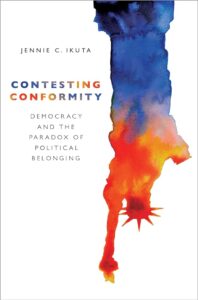Contesting Conformity: Democracy and the Paradox of Political Belonging
 Americans valorize resistance to conformity. “Be yourself!” “Don’t just follow the crowd!” Such injunctions pervade contemporary American culture. We praise individuals such as Martin Luther King Jr. and Steve Jobs who chart their own course in life and do something new. Yet surprisingly, recent research in social psychology has shown that, in practice, Americans are averse and at times, even hostile to individuals who express traits associated with non-conformity, such as individuality, free judgment, and creativity. This disjunction between our public rhetoric and practice raises fundamental questions: Why is non-conformity valuable? Is it always valuable-or does it pose dangers as well as promise benefits for democratic societies? What is the relationship between non-conformity as an individual ideal and democracy as a form of collective self-rule?
Americans valorize resistance to conformity. “Be yourself!” “Don’t just follow the crowd!” Such injunctions pervade contemporary American culture. We praise individuals such as Martin Luther King Jr. and Steve Jobs who chart their own course in life and do something new. Yet surprisingly, recent research in social psychology has shown that, in practice, Americans are averse and at times, even hostile to individuals who express traits associated with non-conformity, such as individuality, free judgment, and creativity. This disjunction between our public rhetoric and practice raises fundamental questions: Why is non-conformity valuable? Is it always valuable-or does it pose dangers as well as promise benefits for democratic societies? What is the relationship between non-conformity as an individual ideal and democracy as a form of collective self-rule?
Contesting Conformity provides a new interpretive lens to the writings of Alexis de Tocqueville, John Stuart Mill, and Friedrich Nietzsche to investigate non-conformity and its relationship to modern democracy. While there are important differences among them, all three thinkers worry that certain aspects of democracy—namely, the power of public opinion, the tyranny of social majorities, and the commitment to moral equality—encourage conformity, thus suppressing dissent, individuality, and creativity. Taken together, Tocqueville, Mill, and Nietzsche show us that to the extent that we are committed to democracy, we must find ways to foster non-conformity, but we must do so within certain moral and political constraints.
Drawing new insight from their work, Jennie Ikuta argues that non-conformity is an intractable issue for democracy. While non-conformity is often important for cultivating a just polity, non-conformity can also undermine democracy. In other words, democracy needs non-conformity, but not in an unconditional way. This book examines this intractable relationship, and offers resources for navigating the relationship in contemporary democracies in ways that promote justice and freedom.
“Contesting Conformity is a deeply engaging work of political theory that challenges us to reconsider our longstanding commitment to nonconformity, reminds us that not all good things go together, and invites us to reflect on what it means for democratic citizens to see themselves as equals.” —Amy Gais, Washington University
“Everyone thinks they love non-conformity; who could be against it? Ikuta’s marvelous Contesting Conformity develops skeptical perspective through careful, thoughtful studies of Mill, Tocqueville, and Nietzsche. Each worried about the democratic tendency to follow the herd, yet Ikuta shows that they offer no comfort to lazy contrarianism. She draws on them to help us see the value of shame, the need for social support of dissenters, and the problem for democratic equality when the arrogance of the powerful is dressed up as heroic individuality.” —Jacob T. Levy, Tomlinson Professor of Political Theory, McGill University
Published:
Oxford University Press, April 2020
Author:
Jennie Ikuta is an Associate Professor of Constitutional Democracy and Political Science at the University of Missouri
